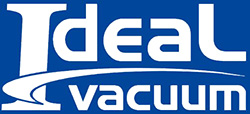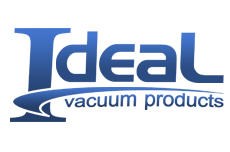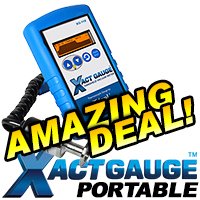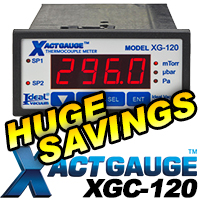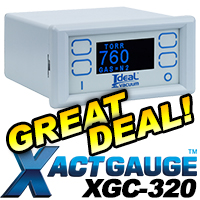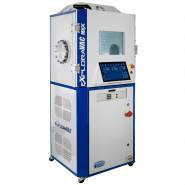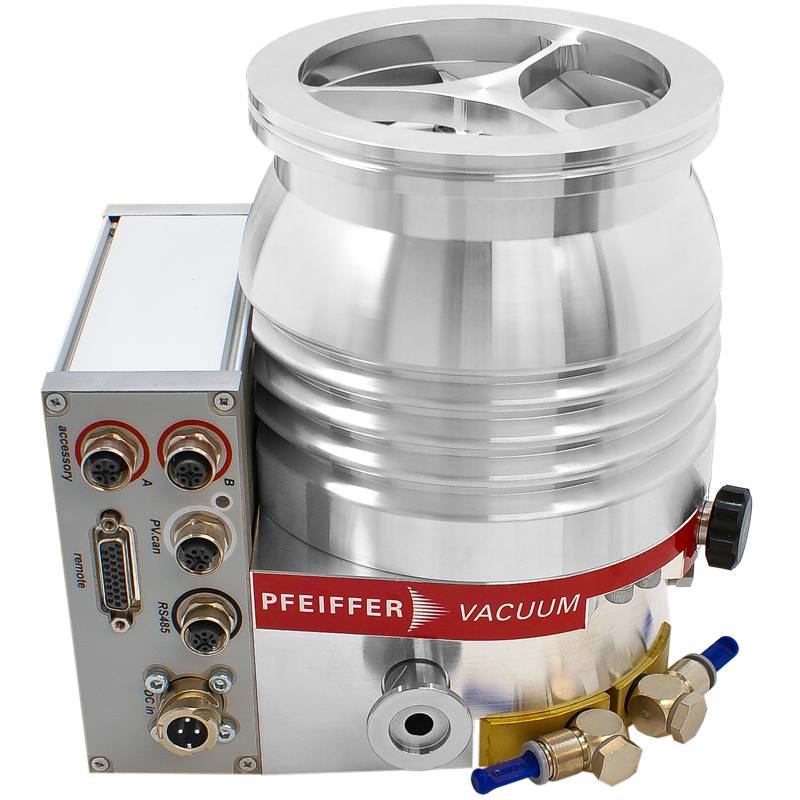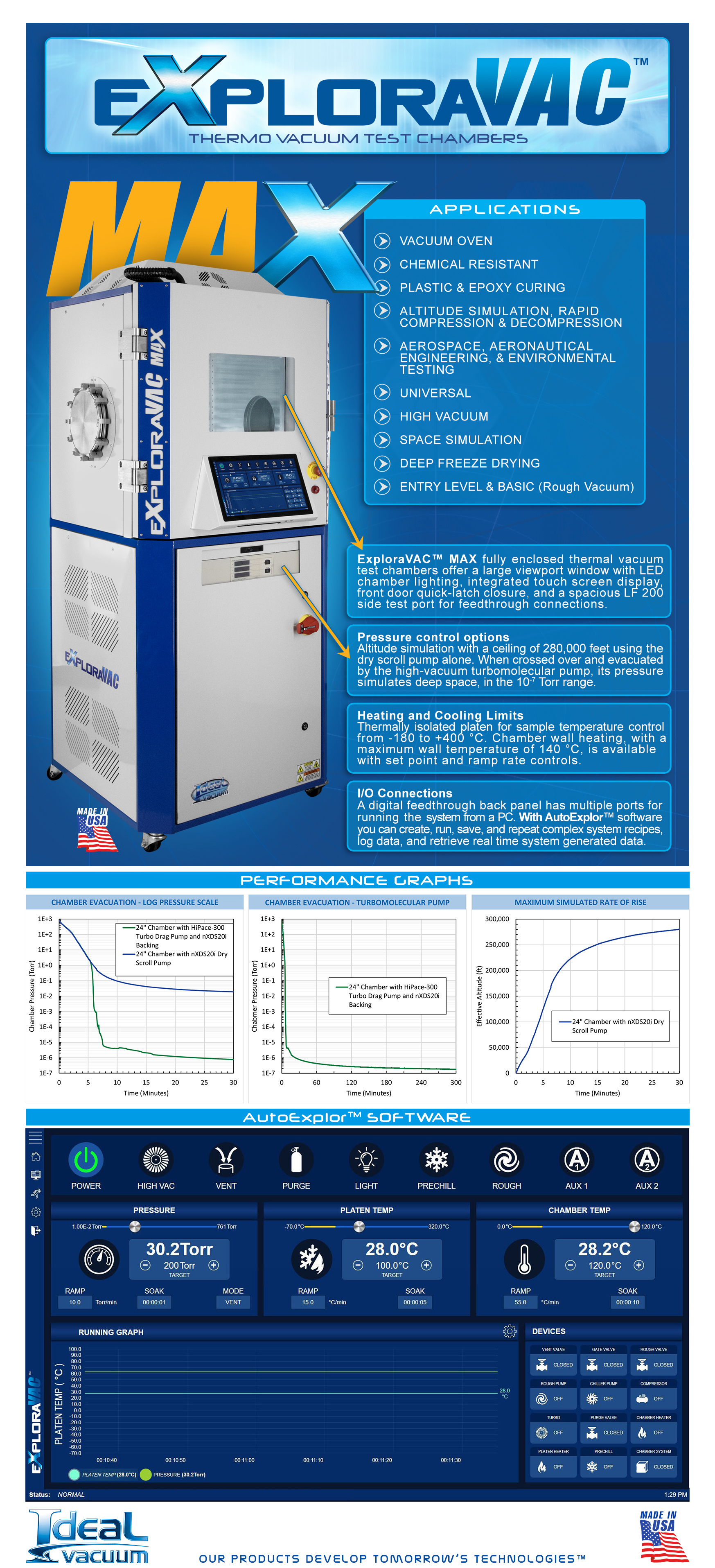The
ExploraVAC™ MAX series is Ideal Vacuum's premier TVAC thermal test chamber product line, which includes many additional features compared to our standard
ExploraVac instruments.
This is our High Vacuum
ExploraVAC MAX TVAC thermal vacuum test chamber system, ideal for high-vacuum processes and is optimized for stability and ease of use. It is a fully integrated, turnkey, high vacuum system featuring a fully enclosed, lighted, cubic 24” inch, welded, 6061-T6 aluminum vacuum chamber and door with viewport, dual ISO LF-200 side ports, and a volume of 8.0 cubic feet. This system includes a Pfeiffer HiPace 300 turbomolecular high vacuum pump and an Edwards nXDS20i dry scroll roughing/backing pump. This system includes two Convectron, a micro-ion, and a piezo-electric vacuum pressure gauge to provide feedback to the user and for the logic controller.
The system includes a built-in touch screen display equipped with
AutoExplor™ software which can control all chamber functions. This system includes a non-expiring basic version of our
AutoExplor software, run by an onboard Windows computer and touchscreen monitor. This easy-to-use software can control and automate all
ExploraVAC MAX functions. Also included is a one-year, renewable, license of
AutoExplor premium version, with many additional features (see below).
This High Vacuum Test Chamber can be upgraded with chamber wall heating (up to 140°C) to bake out the chamber and allow faster and deeper high vacuum. An internally regulated purge gas line can be added to introduce user-selected high purity oxygen-or-water-free gas into the chamber. Other options are available (see Configuration Options, below).
This High Vacuum
ExploraVAC MAX system can reach an ultimate pressure of 1 x 10
-7 Torr, weighs 1034 lbs., and requires single-phase 208-240 VAC, 50/60 Hz, at 21 Amps.
ExploraVAC MAX High Vacuum System Configuration:
- Fully Enclosed 24” Welded Aluminum Vacuum Chamber
- Aluminum Chamber Door with Large Viewport
- Quick-Latch Front Door Closure
- Through Viewport LED Chamber Lighting
- 15.5” LCD Touch Screen Display
- Pfeiffer HiPace 300 Turbo pump
- Edwards nXDS20i Dry Scroll Vacuum Pump (ultimate pressure 20 mTorr)
- Two ISO LF-200 Side Ports (Allows for a variety of feedthroughs to be added)
The
ExploraVAC MAX series of TVAC thermal vacuum chamber process and test instruments create precise environments empowering the operator with complete control over internal chamber pressure and temperature. They are built with innovation in mind. They allow for prototype device exploration in vacuum during the product research and development phase and for precise process control in small batch processing. These thermal vacuum test chamber instruments are designed to allow users to quickly tailor experiments to gather product analysis and diagnostics data as the product is subjected to the extreme stress factors of vacuum and temperature.
ExploraVAC MAX TVAC thermal vacuum test chambers are completely configurable with many available system options.
ExploraVAC MAX System Configuration Options:
- Roughing Pump (dry scroll or dry multi-stage roots, various speeds)
- High Vacuum Turbomolecular Pump (various speeds)
- Full Vacuum Pressure Control
- Heated and Cooled Platen
- Chamber Wall Heating
- Closed-Loop Refrigerated or LN2Cryogenic Cooling System
- Automated Software Control
- Remote Control Operation
- Purge Ports, Chamber Shelving, and Much More
ExploraVAC MAX systems are configured with fully enclosed 24 inch cubic aluminum chambers and doors with viewports and chamber lighting.
The
ExploraVAC MAX TVAC system cabinet has a conveniently angled front panel with computer-controlled touchscreen interface which controls all chamber functions. PID controllers and gauges are installed as required for user selected options. A PLC manages system functions including pump and valve sequencing for efficient pump down cycles and safety interlocks for preventing equipment damage. The front accessible, built-in NEMA style enclosure houses the electronics needed for system operation.
Two spacious LF-200 side ports are available for user-selected or designed accessories, such as an electronic feedthrough for device monitoring or for a vibration pad for shock testing, an infrared lamp array for radiant heating or temperature differential tests, an ultraviolet lamp array for ionizing radiation tests, or a mount for an electron beam. A system can also be customized to obtain any desired rate of rise by adding additional vacuum pumps mounted outside the cabinet.
The back of the cabinet holds a bulkhead feedthrough panel for chamber venting, pump exhaust, and the purge gas option. A digital feedthrough back panel has multiple ports including a DB9 connector for running the system remotely from a workstation or laptop running Microsoft Windows10 or 11 with our
AutoExplor software.
The (non-expiring) basic version of
AutoExplor (P1012102) allows a user to manually control devices while protecting the system.
AutoExplor properly sequences pumps and automatically operates the correct valves for a given request. The user can program pressure and temperature setpoints, ramp rates, soak times, and venting (if the system is equipped with those hardware options). The software provides real-time graphical data streaming so the user can visualize system behavior.
AutoExplor maintains an internal preventive maintenance schedule and notifies the user when system service is due. For example, it notifies when scroll pump tip-seal replacements are needed and when sensor calibration is due. This helps keep the system at peak operating performance. It also provides fault and error messages along with specific troubleshooting information in the case of a device failure so that the issue can be corrected as soon as possible.
The premium version of
AutoExplor (P1012100) includes all the features of the basic software package (above) and adds automated recipe control, data logging, and log export capabilities. Complex test recipes can be created as a step-by-step process, where each step can control the on/off state, setpoints, and ramp rates of multiple devices. One or multiple end conditions for each recipe step may be set using logical operators. The premium version allows the user to quickly generate environmental TVAC test reports from recipe data log files. Logs can be reviewed to ensure targeted process parameters are achieved. The premium version also includes
AutoExplor IP Client, which gives the software the ability to be used as a host that can manage multiple external network clients, and
AutoExplor API (application programming interface), which allows a scientist or programmer to integrate an
ExploraVac instrument into their existing software test suite without using
AutoExplor’s software interface. The premium version must be renewed annually or it reverts to the basic version.
The
ExploraVAC MAX series of TVAC pressure and temperature-controlled test chambers are a perfect solution for many product testing requirements.
Sample Applications
- Environmental Testing Chamber
- Altitude Test Chamber
- Space Simulation Test Chamber
- Thermal Shock Chamber
- Aerospace & Aeronautical Engineering Test Chamber
- High Altitude Flight Component Testing
- Vacuum Oven
- Vacuum Freeze Drying
- Plastic & Epoxy Curing & Outgassing
About High Vacuum Chamber Uses:
High vacuum chambers are used for many scientific and industrial processes. Much scientific instrumentation is done under vacuum especially when electron or other charged particle beams are used. Precision vacuum coating processes, such as vacuum sputtering, physical vapor deposition (PVD), and chemical vapor deposition (CVD) are used to apply very thin optical or protective coatings to semiconductors or precision ground optical substrates. High Vacuum is also necessary for precision semiconductor etching processes. High vacuum can be used to remove water or other residual vapors from extremely cold samples without deforming them, such as in freeze drying biological samples for imaging purposes. High vacuum is necessary for testing space-ready components or devices to determine that they will not outgas when exposed to the extreme low pressures felt in outer space.
